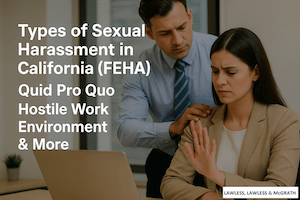Types of Sexual Harassment in California (FEHA): Quid Pro Quo, Hostile Work Environment & More

Quid Pro Quo Sexual Harassment
“Quid pro quo” means “this for that.” This form of harassment happens when someone with authority ties job benefits or punishments to sexual conduct—for example, offering a promotion in exchange for dates, or terminating someone after they refuse advances.
A single incident that results in a tangible employment action—such as firing, demotion, or loss of pay—can be enough to establish this claim.
Hostile Work Environment
A hostile work environment exists when unwelcome conduct based on sex (including gender, pregnancy, sexual orientation, or gender identity) is severe or pervasive enough to alter working conditions and create an abusive atmosphere.
Conduct can be verbal, physical, visual, or electronic—such as email, chat messages, text messages, or video calls.
Sources of conduct may include:
- Supervisors
- Co-workers
- Contractors or vendors
- Customers or clients
Examples include:
- Explicit messages or images
- Lewd jokes
- Unwanted touching
- Repeated comments about appearance
- Circulating sexual memes or photos
Who Is Liable Under California Law?
California’s FEHA has strong protections and clear rules about employer responsibility:
- Supervisor harassment: Employers can be held liable for harassment by supervisors; liability standards differ from co-worker cases.
- Co-worker harassment: Employers may be liable if management knew or should have known about the conduct and failed to act promptly.
- Non-employee harassment: Employers can also be responsible for harassment by clients, vendors, or other third parties if they knew or should have known and failed to act.
- Prevention duty: Employers must take reasonable steps to prevent and promptly correct harassment.
What To Do Next
If you believe you are experiencing sexual harassment at work, you can take these steps:
- Document incidents: Write down dates, times, locations, names of witnesses, and what happened.
- Save evidence: Keep emails, texts, chat logs, photos, voicemails, and any other relevant proof.
- Review your workplace policy: Consider reporting internally if it is safe to do so.
- Consult an attorney: Speak with a lawyer about filing options through the California Civil Rights Department (CRD) or the Equal Employment Opportunity Commission (EEOC).
Our team can help you document your experience, assess liability, and choose the right next steps.
Deadlines to Take Action
- CRD (California Civil Rights Department): Generally within 3 years of the last harassing act.
- EEOC (Equal Employment Opportunity Commission): Typically 180–300 days, depending on the situation and cross-filing rules.
Deadlines for public-sector employees can be shorter—speak with a lawyer promptly to protect your rights.
Why Lawless, Lawless & McGrath
- 80+ years of combined experience litigating harassment claims in California courts.
- Local credibility and leadership roles in Bay Area trial lawyer associations.
- Client-centered approach with boutique attention and resources for complex cases.
- Contingency fee representation—you pay no attorneys’ fees unless we recover compensation for you.
When you’re ready, speak with a San Francisco Sexual Harassment Lawyer or call 415-391-7555 for a confidential consultation.
Frequently Asked Questions
Is one incident enough for quid pro quo harassment?
Yes—if a tangible employment action (termination, demotion, denied promotion) is tied to sexual demands by a supervisor, one incident can be enough.
Can I have a claim if the harasser was a client or vendor?
Yes. California may hold employers responsible for non-employee harassment if they knew or should have known and failed to act.
What if the harasser was my manager?
Supervisor harassment triggers different employer liability rules under FEHA; speak with counsel about your options.
Does digital or remote harassment count?
Yes. Electronic conduct (email, chat, text, video) can create a hostile work environment.
Do I need to complain internally first?
Internal reporting can affect available remedies and defenses; talk with an attorney about safety and strategy before deciding.
